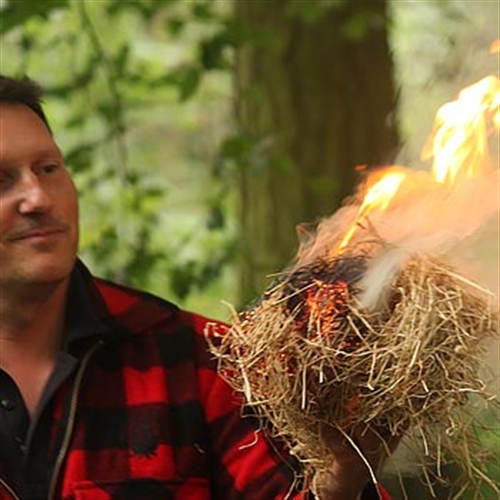This is a version of the site for testing please go to https://www.intotheblue.co.uk to use the live website
Extra 10% off gifts under £250 today! Use code SUMMER10 - T&Cs apply
What's Included
- This course will teach you the skills needed to survive in the wilderness and woodlands
- This is a level 2 Bushcraft, Survival and Wilderness livings skills course and is accredited by the NCFE
- Courses last 2 days
- You will be in a group of up to 16 people
Learn the following skills and techniques:
• Light fires
• Identify edible plants
• Build shelters
• Make traps and snares
• Purify water
• Prepare rabbit, fish and birds
• Use knives and saws safely
• Efficiently navigate around the country
What Can I Expect
Make it to the end of this weekend survival course and you could be walking away with a NCFE IIQ award! This accredited bushcraft course is indeed educational and hands-on, but also a whole lot of fun out in the great British outdoors. Will you have what it takes to survive?
These weekends are organised all year round in both Devon and Staffordshire. Depending on the season, the challenges you face could be keeping warm or trying to keep yourself cool, but whatever the weather and whenever you go, you'll always need to know how to get food, get water, organise shelter and light a campfire. Luckily then, the syllabus for this course includes all that and a whole lot more.
Over two days out in the 'bush' you will watch and learn from the pros. Each task will be demonstrated by one of the survival experts, then it's over to you to have a go yourself. Some of the tasks require real skills and you'll feel an incredible sense of achievement when you do succeed. We especially like the woodcrafting elements, which includes using folding and bow saws, as well as leaning how to fashion wooden tent pegs to keep your tarps in place.
Another feature of these NCFE-approved courses is the food. Most definitely not one for vegans or vegetarians, you will be shown how to prepare game such as pigeon or pheasant, as well as trout, rabbit and even squirrel. Not your usual weekend meal plan, we have to say.
In a similar vein, you'll see how to identify which plants are edible, medicinal or poisonous, as well as being able to name tree species and recognise what their uses could be. You'll also be shown how to lay traps to catch animals for tea, with the legalities of what you're doing being covered too - no-one wants to get into trouble for poaching on this course!
The most basic survival instinct is for water. Particularly poignant if you travel to remote places, you will be able to purify water so that it is drinkable, after all, it's not everywhere in the world that you'll find a nice, fast flowing mountain spring to drink from.
These weekend survival courses start on a Friday evening and go right through to Sunday lunchtime and as the organisers themselves say: 'This is learning through experience at its best'. You will need to go into it with an open-mind, enthusiasm and a 'can-do' attitude and if you have all that, you and your new found bushcrafter buddies will not only survive the course, but have fun and get the certificate to prove it!
When Is It Available
• Courses run from 7pm on the Friday to 12 noon on the Sunday
Location
• Burton-on-Trent, Staffordshire
Suitable For
• Under 18's must be accompanied by a participating adult
• A good general level of fitness is required
Spectators
Anything Else
• Suitable outdoor clothing (see below)
• Sleeping bag
• Insulated sleeping mat
• Knife, fork, spoon, mug, bowl and plate
• Water bottle (1 litre mineral water bottle)
• Torch with fresh batteries & two spare sets
• Wash kit & towel
• Whistle
• Personal toiletries & medication (to include suncreen, insect repellent and lip salve)
• Antibacterial wipes/soap
• Pair of gardening gloves
• Tea or coffee and whitener
• Small first aid kit (plasters, bandage, headache pills etc.)
• Spare change of clothing
• Camera, notebook & pen (optional)
OUTDOOR CLOTHING
Outdoor clothing should be tough and comfortable. Wearing several thin layers is better than a few thick layers. A waterproof jacket and several sweatshirts underneath are sufficient. Jeans should not be worn, as they are slow drying, clinging and cold. Natural colours or camouflage will give you a better chance of spotting wildlife. Walking boots are ideal, but wellies in wet weather and trainers in dry weather will suffice.







